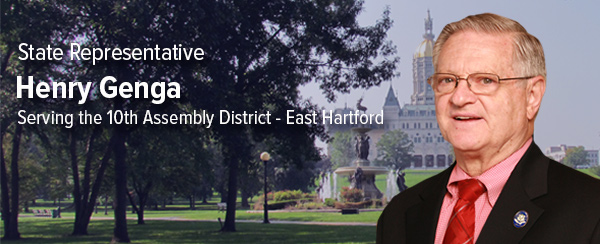
August 20, 2010
LEGISLATURE SAVES CITIZEN’S ELECTION PROGRAM,
REDUCES OVERALL POTENTIAL COSTS
By State Reps. Henry Genga and Timothy Larson
Clean elections and dollars in the bank. By overriding the governor’s veto of campaign finance reform legislation, Democrats ensured both results.
Connecticut’s landmark Citizens’ Election Program (CEP) – public financing of state elections – originally had an estimated cost of $36.8 million and we reduced the price tag by $2.3 million.
The program has already been proven successful in just a few short years. Special interest money was removed from political campaigns, more candidates have thrown their hats in the ring for every office and the financial playing field is more level for all office seekers.
Though last month’s federal appeals court ruling deemed a few aspects of the program unconstitutional, we and our colleagues in Legislature have been quick to act to ensure that the mission and goals of public financing are not compromised as we head toward Election Day in November.
Legislation passed by the General Assembly and, coincidentally, vetoed by public financing proponent Governor Rell, addresses the court’s concerns.
A major decision by the court eliminated “supplemental” grants for candidates participating in the CEP. These grants are allocated when an opponent of a CEP candidate exceeds the established spending limits set up by the program.
For example, the initial general election grant for participating gubernatorial candidate A is $3 million. If a self-funded opponent candidate B decided to spend more, candidate A would be eligible for up to an additional $6 million depending on the total campaign expenditures of B. Without such supplemental grants, publicly financed candidate A is at a severe disadvantage to wealthy candidate B.
To help avoid this unfair mismatch and adhere to the court’s decision, the legislature increased the initial gubernatorial grant to $6 million and eliminated the supplemental grant as well as a matching grant for “independent” expenditures.
Since the CEP budget is funded with self-sustaining non-tax escheats money held by the state treasurer, there is no additional cost to this approach – in fact it costs less than the original formula where candidates for governor could get $9 million ($3 million initially and up to an additional $6 million from a supplemental grant). It also is less than the projected spending from the fund before the court issued its ruling.
In addition, the court ruled that a total ban on lobbyist contributions to campaigns was unconstitutional. In response, the legislature had to allow lobbyists to contribute, but we limited the donations to $100 per candidate. The current prohibition of lobbyist contributions during legislative sessions remains in effect.
Thankfully, the court upheld the ban on campaign contributions from state contractors. Unfortunately though, the court struck down the ban on contractors and lobbyists soliciting others for donations on behalf of candidates. These provisions are very complicated, and with Election Day less than three months away, the legislature decided to limit the solicitations as of January 1, so that this year’s elections could proceed without further litigation, and to prohibit the “bundling” of checks and lobbyist fundraisers immediately.
The CEP helps remove special interest money from campaigns and level the playing field for candidates – and it frees up those running for office to talk to voters more about the issues and challenges facing our state and less about soliciting donations.
By overriding the Governor’s ill-advised veto, the legislature has assured voters that special interest money effectively remains eliminated from the election campaign process and wealthy candidates cannot simply buy their way into office.